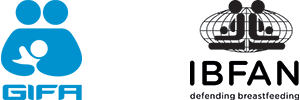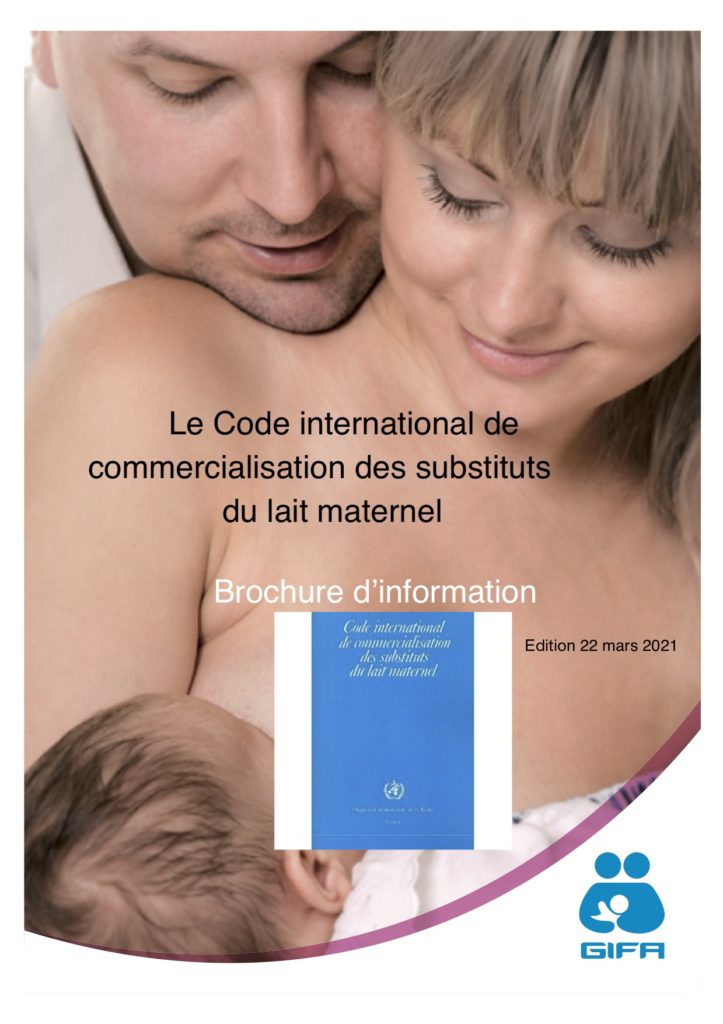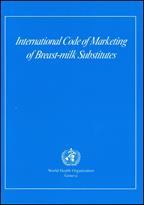
10/25/2024
NEW: 2024 – Status of the Code Report
https://www.who.int/publications/i/item/9789240094482 This report provides updated information on the status of implementation of the International Code of Marketing of Breast-milk Substitutes (BMS) and subsequent relevant World Health Assembly (WHA) resolutions.
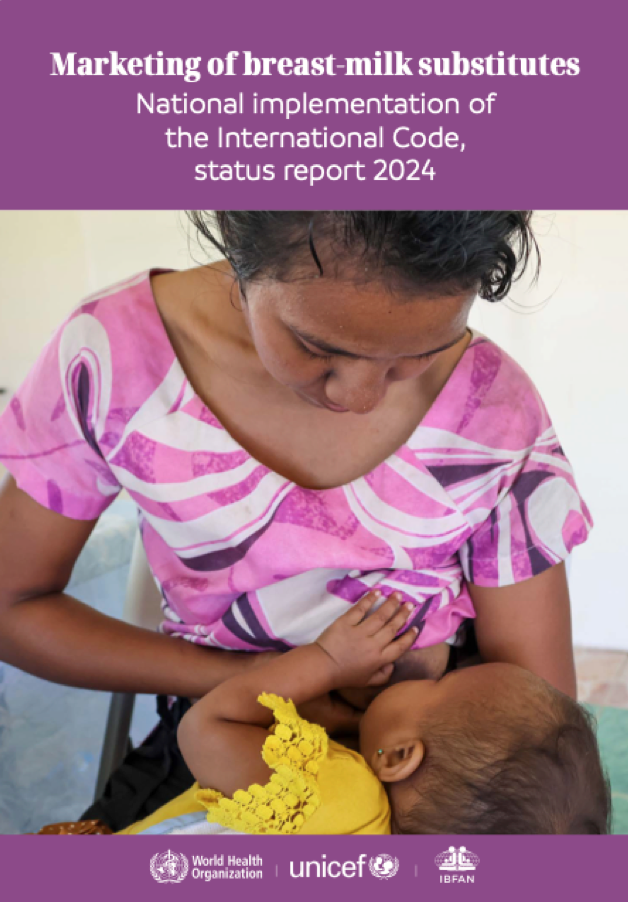
What is the International Code?
The International Code of Marketing of Breast-milk Substitutes and subsequent Resolutions consists of 11 articles adopted by the World Health Assembly in 1981 (WHA34.22) and some 20 subsequent Resolutions.
The practice of breastfeeding, although crucial for the healthy development of infants and young children, is threatened by abusive and misleading marketing aimed at promoting the sale of breastmilk substitutes, bottles and teats. The International Code sets out a strict framework for the advertising of such products to ensure that parents have adequate and commercially independent information on which to base their child’s feeding decisions. The Code protects both breastfed and non-breastfed babies from commercial pressures.
- Link to the International Code and subsequent Resolutions
- Download the Code and Subsequent Resolutions 1981-2022 1981-2022-Code-and-ResolutionsDownload
Why do we need an International Code?
Breastfeeding is normal food and nourishes the baby lifelong, protects the baby from disease and deaths. According to an international study, annually, 100,000 child deaths could be saved in India if breastfeeding practices were adequate. In COVID -19 times breastfeeding can protect both babies and mothers with its antibodies. But, Baby food companies continue to attack and replace breastfeeding with their products; blatantly breaking the Indian law to protect breastfeeding, the Infant Milk Substitutes Feeding Bottles, and Infant Foods (Regulation of Production, Supply and Distribution) Act 1992, and Amendment Act 2003.(IMS Act)
The Code and its subsequent WHA Resolutions are a “minimum requirement” that Member States are required to adopt and implement in full through national legislation or other national measures.
In addition, it represents a way to comply with the Maastricht Principles on Extraterritorial Obligations of States (2011). IBFAN GIFA has described the relationship between these Principles and the Code in a document available in English:
Objectives of the Code
“The purpose of this Code is to contribute to the provision of safe and adequate nutrition for infants by protecting and encouraging breastfeeding and by ensuring the correct use of breast-milk substitutes, when necessary, on the basis of adequate information and through appropriate marketing and distribution.”
One of the major objectives of the International Code is therefore to regulate the advertising and marketing of breast-milk substitutes and thereby protect breastfeeding.
The 10 principles of the Code
- A ban on advertising to the general public
- A ban on giving out free samples
- A ban on all marketing in the healthcare system
- A ban on the use of staff paid by manufacturers to give advice to mothers
- No gifts or personal samples to health workers
- No images of infants or other graphic representations that idealise the use of infant formula on product labels
- Information provided by manufacturers and distributors to health professionals must be scientific and limited to the facts.
- All packaging and labels must clearly state the superiority of breastfeeding and warn of the risks and costs of artificial feeding.
- No promotion of sweetened condensed milk or other inappropriate products as infant food.
- All products must be of good quality and the climatic and storage conditions of the country concerned must be taken into account.
Documents on the International Code
2024 – Papers on Sponsoring
See our Publications section for three papers on sponsoring and how to avoid conflicts of interest.
2023 – Guidance on regulatory measures
Digital environments are fast becoming the predominant source of exposure to promotion of breast-milk substitutes globally. Digital marketing amplifies the reach and power of advertising and other forms of promotion in digital environments, and exposure to digital marketing increases the purchase and use of breast-milk substitutes.
In light of this evidence, the Seventy-fifth World Health Assembly requested that WHO develop guidance for Member States on regulatory measures aimed at restricting the digital marketing of breast-milk substitutes. This guidance applies to marketing of products within the scope of the Code as well as foods for infants and young children that are not breast-milk substitutes. https://www.who.int/publications/i/item/9789240084490
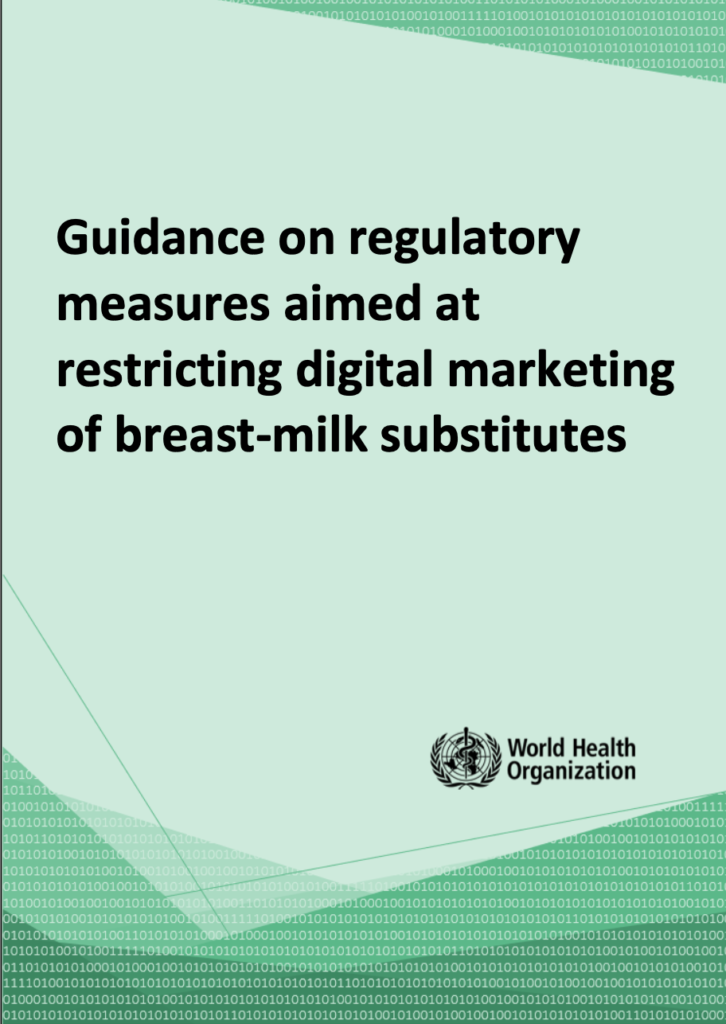
2023 – Lancet Breastfeeding Series
This three-paper Series outlines the multifaceted and highly effective strategies used by commercial formula manufacturers to target parents, health-care professionals, and policy-makers. The industry’s dubious marketing practices—in breach of the breastfeeding Code—are compounded by lobbying of governments, often covertly via trade associations and front groups, against strengthening breastfeeding protection laws and challenging food standard regulations. https://www.thelancet.com/series/Breastfeeding-2023
2023 – Congress on the Code
To assist countries in strengthening their efforts to fully implement the Code, the World Health Organization (WHO) and the United Nations Children’s Fund (UNICEF) convened the first Global Congress on Implementation of the Code of Marketing of Breast-milk Substitutes on June 20-22, 2023. Delegates from over 100 countries around the world gathered at the WHO Headquarters to strengthen the protection of breastfeeding through the Code. The Congress covered six key themes that are essential for effective Code implementation.
Global Congress on Implementation of the International Code of Marketing of Breast-milk Substitutes Summary report, 20-22 June 2023, 12 February 2024 https://www.who.int/publications/m/item/global-congress-on-implementation-of-the-international-code-of-marketing-of-breast-milk-substitutes
2022 – Effective regulatory frameworks for EU Region
Effective regulatory frameworks for ending inappropriate marketing of breast-milk substitutes and foods for infants and young children in the WHO European RegionThis Policy Brief is intended to guide Member States in the WHO European Region as they embark on the vital task of safeguarding parents and caregivers from all forms of promotion of breastmilk substitutes (BMS) and the inappropriate promotion of foods for infants and young children (FIYC). Such promotion undermines optimal infant and young child feeding practices, including breastfeeding and safe and appropriate complementary feeding, placing a child’s survival, growth and development at risk. It can also contribute to the growing public health problem of childhood overweight and obesity, which can lead not only to premature mortality from non-communicable diseases (NCDs), but also to adverse health outcomes throughout life. In Eastern Europe and Central Asia, the number of children under five with overweight has increased from 1.6 million in 2000 to 4.5 million in 2016. United Nations human rights experts have reminded States of their obligations under human rights treaties to “take all necessary measures to protect, promote, and support breastfeeding, and end the inappropriate promotion of breast-milk substitutes and other foods intended for infants and young children up to the age of 3 years”. https://www.who.int/europe/publications/i/item/WHO-EURO-2022-4885-44648-63367 (16 February 2022)
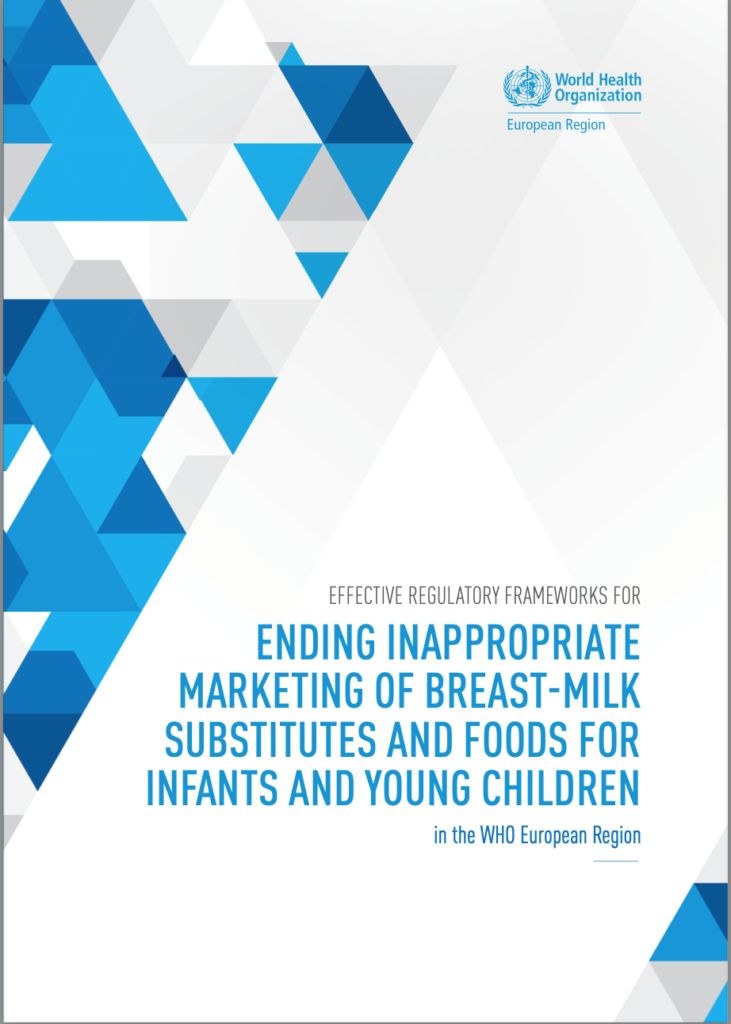
2022 – three new WHO reports
1. How the marketing of formula milk influences our decisions on infant feeding. – Marketing a 55 billion dollar formula milk industry. (February 22, 2022) See also our News Post
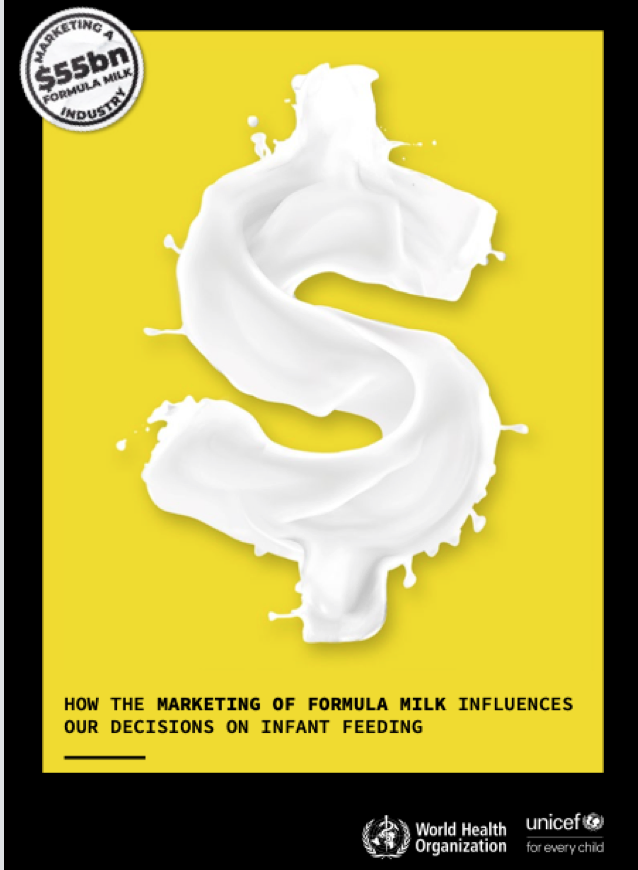
2. Scope and impact of digital marketing strategies for promoting breastmilk substitutes (April 28, 2022) https://www.gifa.org/wp-content/uploads/2024/03/9789240046085-eng.pdf
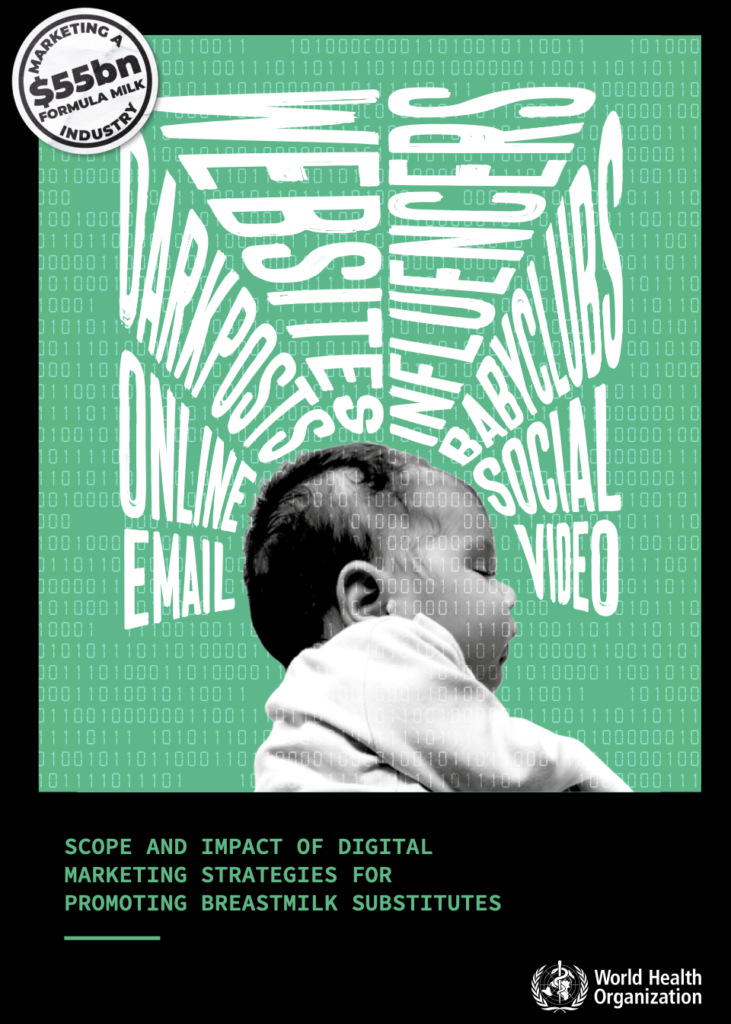
3. WHO Status report 2022 on the national implementation of the International Code (May 12, 2022)

2021 – 40th anniversary of the International Code
40 Years of the International Code: see the program and video of the speakers and our News Post 40 ans de Code international 1981 – 2021
On May 21, 1981, the World Health Assembly (WHA) endorsed one of the most powerful tools to protect breastfeeding- the “International Code of Marketing of Breastmilk Substitutes” It recognised that commercial marketing of baby foods is harmful to the health of infants. Decades of relentless struggle of mothers, health professionals, public health experts, feminists, activists, against corporate push to powdered milk formula, made it possible.
21 May – World Breastfeeding Protection Day
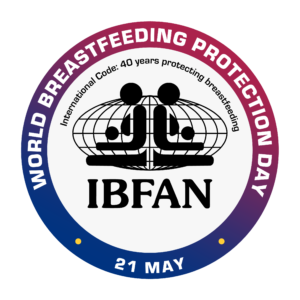
In 2021, to mark the 40th anniversary of the Code, breastfeeding advocates around the world have decided to celebrate 21 May each year as World Breastfeeding Protection Day. This day highlights the fact that women and children must be protected from the onslaught of poorly marketed baby foods. Although some countries have sufficient laws to protect breastfeeding, action is needed to ensure that they are respected.
Get to know the Code
GIFA – Information brochure in French
Our 4-page brochure is intended for anyone who wishes to have an overview of the scope and issues of the International Code of Marketing of Breast-milk Substitutes. Updated March 22, 2021.
Film about IBFAN-GIFA
Film about IBFAN A 7-minute film summarizing the work of IBFAN – GIFA, which was shown at the ceremony for the 40th anniversary of the International Code in 2021. The International Code of Marketing of Breast-milk Substitutes and Relevant Resolutions, abbreviated as “The Code”: an indispensable tool to protect, encourage and support breastfeeding and infant and young child feeding (IYCF).
The Code around the World
Every two years, WHO and its partners assess the status of Code implementation and publish the State of the Code Report. The webinar at the launch of the 2020 Report takes stock of the situation with reference to the COVID-19 context (see our NEWS POST on this subject):
“The COVID-19 pandemic highlights the importance of protecting optimal nutrition, including breastfeeding, to improve child health and survival. Artificial milk manufacturers are exploiting panic and fears of contagion to escalate their aggressive marketing practices.”
Who monitors compliance with the Code?
Although generally not binding on states, WHA resolutions “carry moral or political weight because they constitute the judgment of the entire membership of the highest international body in the field of health on a health issue.” (Shubber S., 1985, The International Code, Digest of Health Legislation, 36 (4): 884).
In addition, the Code applies directly to industry, regardless of the implementation measures taken by Member States (Article 11.3) and national legislation.
Non-governmental organizations, professional groups, institutions and individuals concerned are responsible for reporting violations of the Code to the relevant industry and to the competent national authority. In this regard, the International Code Documentation Center of the IBFAN network collects, catalogues and publishes violations in its report “Breaking the rules, stretching the rules” (latest edition: 2017).
Other international organizations, such as the Joint FAO/WHO Codex Alimentarius Commission, are responsible for supporting and promoting the implementation of the Code.
The Status of the Code reports
They monitor every two years the implementation and compliance with the Code.
Who is responsible for compliance with the International Code?
It is the responsibility of all – governments, manufacturers and retailers, the health and care community – to monitor compliance with the Code and to report violations to state health officials and/or state representatives in parliament in their countries. Everyone has the right to alert public opinion and policy makers to inappropriate and/or irresponsible marketing practices of breastmilk substitutes.
Role and responsibility of health professionals
WHO FAQ 26 mai 2020 The international code of marketing of breast-milk substitutes: frequently asked questions on the roles and responsibilities of health workers (en anglais). https://www.who.int/publications/i/item/9789240005990
But violations continue…
As Baby Milk Action (IBFAN UK) notes with regret, violations of the International Code continue around the world, to the detriment of breastfeeding and unbiased information to parents. http://www.babymilkaction.org/monitoring-global
Levers to reinforce the Code
The provisions of the Code and related subsequent resolutions have been incorporated into other international instruments such as :
- The Innocenti Declaration 1990 and Innoncenti 2005
- The Global Strategy for Infant and Young Child Feeding (IYCF, 2002)
- The Committee on the Rights of the Child (CRC) considers the implementation of the International Code as one of the measures to enable States to fulfil their obligations with regard to the rights of the child, and more particularly the right of the child to the enjoyment of the highest attainable standard of health (Article 24 of the Convention on the Rights of the Child, 1989). The CRC supports the International Code and encourages breastfeeding through General Comment No 15 (2013, paragraphs 44 and 81) and General Comment No 16 (2013, paragraph 54). More information here
- The Committee on Economic, Social and Cultural Rights (CESCR) refers in its General Comment No 24 to the International Code and subsequent WHA resolutions as a measure to be considered by States in the context of their obligation to protect public health (paragraph 19): “The obligation to protect sometimes necessitates direct regulation and intervention. States parties should consider measures such as restricting marketing and advertising of certain goods and services in order to protect public health, such as of tobacco products, in line with the Framework Convention on Tobacco Control, and of breast-milk substitutes, in accordance with the 1981 International Code of Marketing of Breast-milk Substitutes and subsequent resolutions of the World Health Assembly;..”
- Since 2005, the WBTi (World Breastfeeding Trends initiative) has included in its assessment the status of implementation of the International Code in the country where the audit is conducted. This is indicator 3 (among a total of 10 indicators). For Switzerland, see WBTiSwiss
- The Baby-Friendly Hospital Initiative (BFHI) emphasizes the importance of Code compliance in its 2018 criteria revision by stating that “Full compliance with the International Code of Marketing of Breastmilk Substitutes and subsequent relevant WHA Resolutions is required.” See new Implementation Guidance
History – why “Code” and not “Treaty”
You may ask yourself why the Marketing regulation is not a legally binding Treaty, but only a Code, based on voluntary action by each governement, there for less strong.
According to Sami Shubber, the “Code” approach was chosen (instead of a Treaty) to accommodate US President Jimmy Carter to ensure that there would be a consensus or unanimity, but Ronald Reagan won the election before a decision was taken by the WHO and the new US federal government voted against even the “softer” law approach.
Source : Sami Shubber, The World Health Organization International Code on the Marketing of Breast-milk Substitutes: History and Analysis, 2011, Kluwer Law. at chapter two, sections 1,006 to 1,249 (with a forward by (the late) Sir Robert Jennings, former President and Judge of the International Court of Justice and Professor of International Law, Cambridge University and Chair of the Drafting Group of the 3rd and 4th (final) drafts of The Code. Available behind a paywall at: https://www.amazon.ca/International-Code-Marketing-Breast-Milk-Substitutes/dp/1905177461
Even with this softer version, the “Code” has not yet been signed by the USA today, in 2024. To understand the rationale behind this decision, it is important to know that Marketing of breastmilk substitutes is free for all in the USA as there are no federal laws that prohibit such marketing.
Article 5.1 of the Code states that there should be no advertising or other form of promotion to the general public of products within the scope of the Code. One reason the USA has not legislated the Code is the 1st amendment to the Constitution, “Congress shall make no law…abridging the freedom of speech.” Advertising is a form of “free” speech although it is commercial.
What the government can do is restrict or ban false, misleading, deceptive, or unfair statements and claims made by commercial entities. The Federal Trade Commission is the national consumer protection authority where complaints should be filed. Each state attorney general is the consumer protection authority for that state.
To check on state laws regarding breastfeeding in general, one can access the National Conference of State Legislatures at https://www.ncsl.org/health/breastfeeding-state-laws. Because the USA has a decentralized form of government, state laws often fill in where federal laws fall short.
Special thanks to Marsha Walker and Bill Jeffery for the informations in this section.
